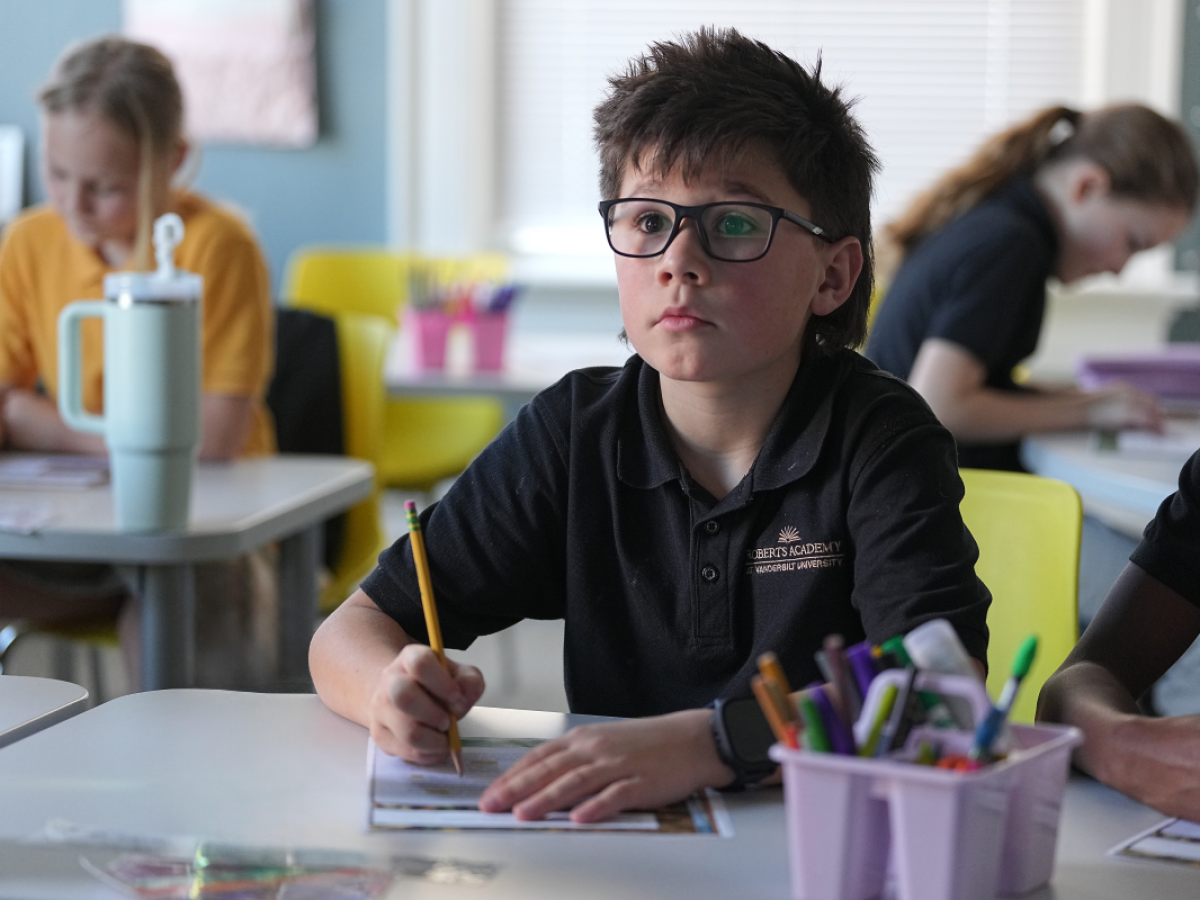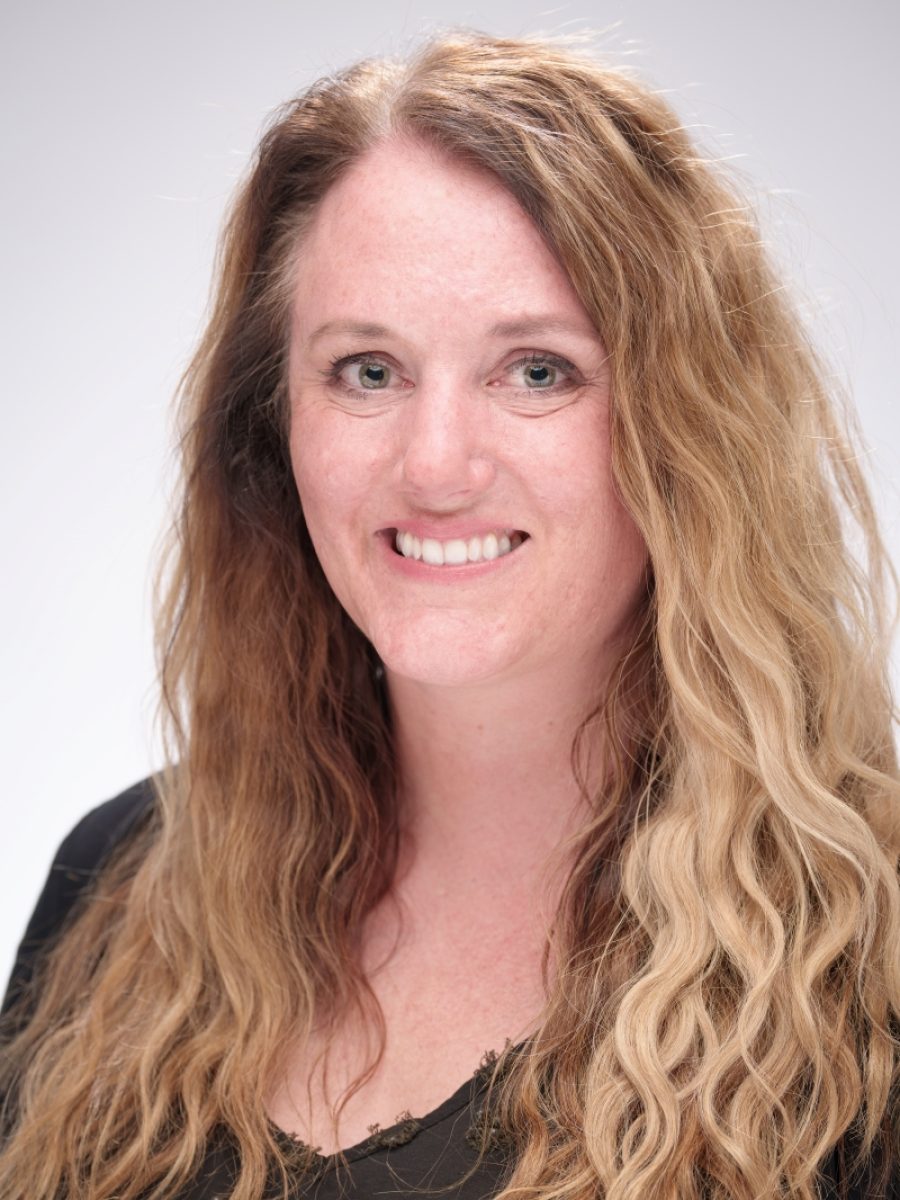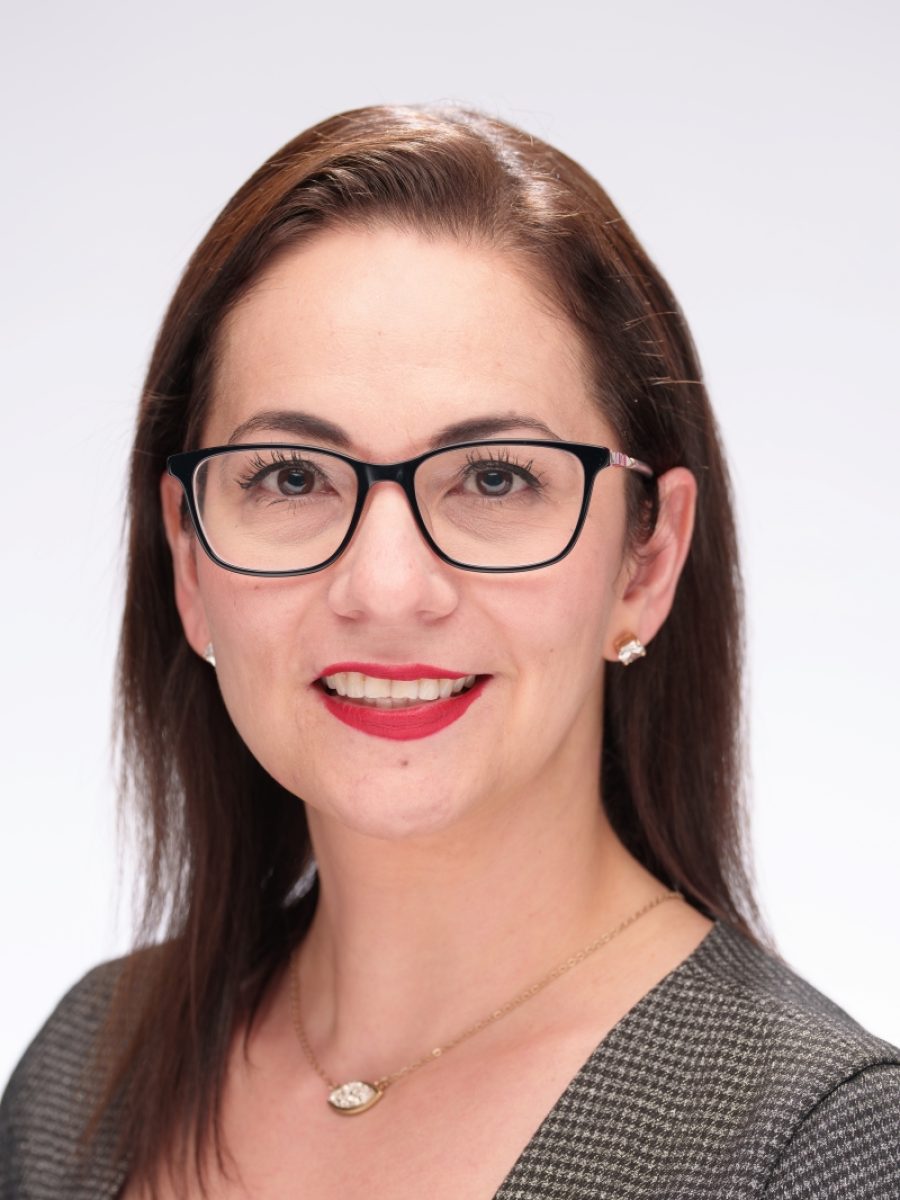Personalized, State-of-the-Art Education
The Roberts Academy features small class sizes, with reading intervention delivered in groups of four or fewer students.
A tiered opening of the Roberts Academy is planned, with the academy operating in existing space at Vanderbilt until construction of a new building on Vanderbilt’s Peabody College campus is complete. The academy opened with 3rd and 4th grades in fall 2024. In fall 2025, we will continue services for existing students with programming for 4th and 5th grades. Pending completion of the construction of the new building, in fall 2026, we will serve 3rd through 5th grades, increasing the number of students served in each grade. In fall 2027, 2nd grade will be added and in fall 2028, 1st grade.
The academy will include state-of-the-art classrooms and indoor and outdoor spaces to inspire collaboration, physical activity and community engagement. Enrichment programs within and outside of the school day will be a hallmark of the Roberts Academy, fostering curiosity and confidence in children as students and as leaders.
The Vanderbilt Advantage
Peabody College’s Department of Special Education (SPED) at Vanderbilt University has long been a world leader in advancing research and practice to benefit children and youth with learning disabilities. The dyslexia-related expertise of faculty members within SPED has been a pivotal part of the planning and development of the Roberts Academy model and programming. To stay grounded in the most current, cutting-edge research being conducted within SPED, a subset of the Roberts Academy’s Academic Advisory Council will be reserved for department faculty as part of an ongoing commitment to collaborate with and leverage the expertise of dyslexia researchers leading the field.
Our Approach
The Roberts Academy’s instructional approach follows the principles of intensive intervention and distinguishing features of the Orton-Gillingham approach that have proven effective for students with dyslexia who have persistent academic needs. Simultaneously, our instructional approach aims to foster in our students an enjoyment of learning, perseverance when learning gets more challenging and frequent collaboration with other students to support social and academic development. Our instructional approach is:
Admissions
Step-by-Step Application Process:
- Online Application:
- Inquiry Form: The first step of the online application is an inquiry form. Upon completing the inquiry form, you will gain access to the Admissions Portal, which will include a recorded information session to learn more about the Roberts Academy at Vanderbilt University prior to completing the full application.
- Admissions Portal: Within the Admissions Portal, you will complete the application checklist, which includes providing professional references and a records release allowing Roberts Academy to request educational records from your child's current school.
- Financial Aid Application: If you indicate on your application for admission that you are seeking need-based assistance, you will receive a follow up application for financial aid.
- Roberts Academy Screening Assessment: After you submit your completed application, you will hear from a member of the Roberts Academy team. If after reviewing your application the Admission team determines your child is a candidate for Roberts Academy, we will schedule a time for us to meet your child. During that appointment, a member of our team will assess your child to gather the information necessary to determine whether the Roberts Academy is best suited to meet their needs. Parents will have an opportunity to tour the school during their child's assessment.
- Admissions Decisions: Admissions decisions and financial aid awards are released no earlier than March 1st.
Tuition and Financial Aid
At the Roberts Academy, it is our resolve to make the highest quality education accessible and affordable to all admitted students. We believe cost should never be a barrier to a world-class education, and we are working to provide financial assistance for households who demonstrate financial need.
For the 2025-2026 school year, tuition is $20,500. This cost does not include after-care or other school-related expenses. If you indicate on your application for admission that you are seeking need-based assistance, you will receive a follow up application for financial aid as part of the admissions process. We will provide financial assistance on an individual basis.
For additional questions about the admissions process, please contact us at admissions@robertsacademyvanderbilt.org.
Outreach and Support
After-school programming and summer programming is in development.
News
- Vanderbilt News: Roberts Academy at Vanderbilt to break ground on permanent location near Peabody campus
- NewsChannel 5: How this one school in Nashville focuses on dyslexic learners
- Vanderbilt News: Roberts Academy opens at Vanderbilt to serve students with dyslexia
- Vanderbilt News: Roberts Academy and Dyslexia Center hires Jared Clodfelter as academy director
- Businesswire: Vanderbilt University establishes Roberts Academy and Dyslexia Center
- Tennessean: Vanderbilt University unveils plans for new dyslexia academy, research center
- Nashville Post: Slideshow — Vanderbilt University announces dyslexia center
Staff

Jared Clodfelter, EdD’22
Academy Director
Jared Clodfelter earned his education doctorate in K-12 Educational Leadership and Policy at Vanderbilt University’s Peabody School and holds 15 years of experience in education, including his most recent role as the upper school division head at Currey Ingram Academy, a college-preparatory school for students with learning differences. Clodfelter also served as the academy’s dean of studies.
Clodfelter has taught internationally and domestically, in special and general education classrooms. He served as a learning specialist and English language learner teacher at the Vision International School in Doha, Quatar, teaching reading to six-year-old native Arabic speakers. He also taught English at the Marian Baker School in San Jose, Costa Rica. Prior to these roles, Clodfelter was a Metro Nashville Public Schools English teacher and instructor at Fort Wayne Center for Learning in Indiana.
In addition to his Ed.D. from Vanderbilt, he holds a master of education in educational leadership from Carson Newman University and a bachelor of science in language arts education and exceptional needs from the University of Saint Francis.

Samantha Gesel, PhD’19
Assistant Director
Samanta Gesel, assistant professor of the practice of special education in Vanderbilt University’s Peabody College of education and human development, serves as assistant director of the Roberts Academy. Gesel received her Ph.D. in special education from Vanderbilt in 2019. Her research focuses on intensive intervention and data-based decision making in reading for students with the most persistent reading difficulties. Prior to joining the Vanderbilt faculty, she was assistant professor in the Department of Special Education and Child Development at the University of North Carolina at Charlotte.
Gesel has received several honors throughout her career, including the TED Publication Award from the Council for Exceptional Children: Teacher Education Division; the Cato College of Education Research Award from the University of North Carolina at Charlotte; and Early Career Award from UNC Charlotte. Her doctoral research received honors from the Council for Exceptional Children: Division for Learning Disabilities; the Council for Exceptional Children: Division for Research; and the Badar-Kauffman Conference on Contemporary Issues in Special Education.
Gesel is a consulting editor on the editorial board of The Journal of Learning Disabilities. From 2020-2022, she served on the North Carolina Statewide National Center on Intensive Intervention (NCII) Committee. From 2020-2023, she was co-director of the UNC Charlotte Reads Program. She has also served as a site director for UNC Charlotte’s Summer Reading Clinic.
Staff
-
Molly Anderson
3rd Grade Teacher
-
Kylee Roden
3rd Grade Teacher
-
Fatima Mendoza
4th Grade Teacher
-
Kelley Hayes
Interventionist
-
Katherine Rogers
Interventionist
Join Our Staff
The Roberts Academy and Dyslexia Center will post all positions on Vanderbilt University’s “Work at Vanderbilt” website. Sign up for our mailing list to be notified about employment opportunities.
Stay Informed
Join our mailing list to receive newsletters and updates about the Roberts Academy and Dyslexia Center.
Contact Us
If you need to reach the Roberts Academy, you can reach us by phone at 615-343-3008.





